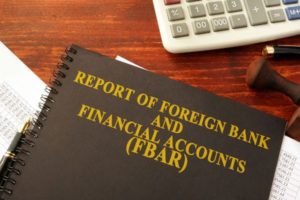
The general rule is that you’ll need to disclose all unfiled FBARs during the past six tax years. This is the disclosure period required under the Streamlined Filing Compliance Procedures and the New Offshore Disclosure Program.
If you weren’t required to file an FBAR in all six years, you can just file for the years you should have filed an FBAR. You generally aren’t required to file FBAR outside of this disclosure period, but you have the option to file additional FBARs under the Offshore Disclosure Program.
Consequences of Late FBARs
The consequences of filing your FBARs late will depend on which offshore disclosure method you use:
- If you use the delinquent FBAR submission procedure—also known as a quiet disclosure—you won’t need to submit any penalty payments. You can only use this method if you have already reported and paid tax on any income you had from your foreign financial accounts.
- If you use the Streamlined Procedures, you may have to submit a miscellaneous offshore penalty equal to five percent of your highest aggregate account balance during the disclosure period. You’ll also need to pay all back taxes and interest due.
- Taxpayers who use the new Offshore Disclosure Program may need to pay willful FBAR penalties, in addition to other tax penalties. You can instead argue for the assessment of non-willful FBAR penalties in some cases.
Keep in mind that if you don’t disclose your unreported offshore accounts, the IRS can assess both civil and criminal penalties for the failure to file FBARs.
FBAR Penalties
If you are assessed civil FBAR penalties, the amounts can vary drastically depending on your circumstances. If you have six years of FBAR violations, you could receive a non-willful FBAR penalty of $10,000 for each year. However, the IRS examiner also has the discretion to assess a single FBAR penalty or to lower the penalty amount even further.
When you have multiple years of willful FBAR violations, the penalties can go as high as 100% of your highest aggregate account balance during the disclosure period. You may also receive much lower penalties, particularly if you qualify for use of the mitigation guidelines.
If you have several years of unfiled FBARs, contact a tax attorney to discuss your offshore disclosure options.
Get help with offshore disclosure matters by calling The Gartzman Law Firm at (770) 939-7710. We can listen to your concerns and help you find the best tax resolution strategy for your case.

